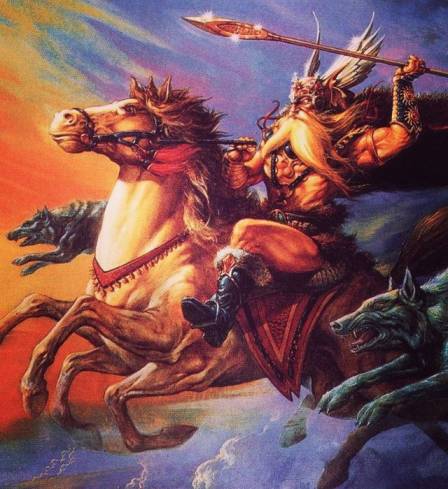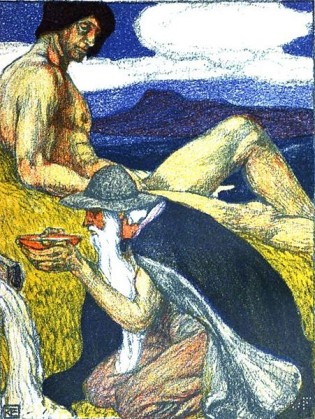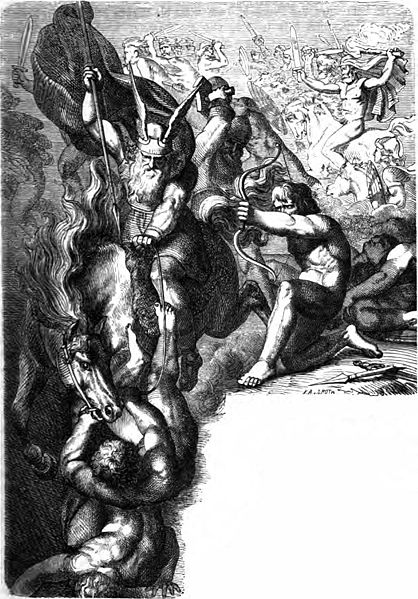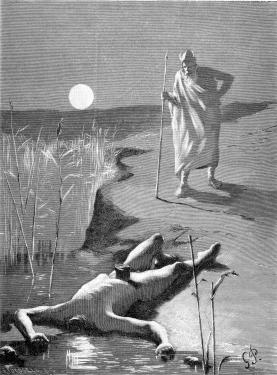Through the stories of Norse mythology, you come to learn that Odin the Allfather is the wisest of all the gods. What he sacrificed in pursuit of that wisdom is not known to everyone. In this story, you learn how Odin lost his eye but gained almost infinite wisdom.
The Norse gods were not the kind of gods to turn the other cheek, or quick to forgive. Instead, they were a violent lot never shying away from a challenge or literally cracking skulls if need be. Much like the vikings themselves, their gods willingly stepped into the fray of battle.

While violence was never far away, the gods had a great appreciation for poetry and valued wisdom above all else. With this emphasis on knowledge and wisdom, it is no surprise that Odin was always seeking more of it.
In another interesting twist on the relationship between giants and the Aesir gods, Mimir the guardian of the well of wisdom is a giant. It has also been suggested that Mimir might in fact be the brother of Bestla. In which case he would be Odin’s uncle.
In this story, we learn how Odin lost his eye or more correctly gave up an eye willingly for the wisdom it would bring.
The beginning at Mimir’s well
Below the roots of Yggdrasil, the giant tree of life that grew through all of the cosmos, in the spot where the sky and ocean met was a secret well. Here for centuries and centuries, the giant Mimir had sat keeping guard over his hidden well, in the bottom of which lay such a treasure of wisdom as was to be found nowhere else in the world.
Every morning Mimir dipped his glittering horn Giöll into the fountain and drew out a draught of the wondrous water, which he drank to make him wise. Every day he grew wiser and wiser; and as this had been going on ever since the beginning of time, you can scarcely imagine how wise Mimir was.
Now it did not seem right to All-Father Odin that a giant should have all this wisdom to himself; for the giants were the enemies of the Aesir, and the wisdom which they had been hoarding for ages before the gods were made was generally used for evil purposes. Moreover, Odin longed and longed to become the wisest being in the world. So he resolved to win a draught from Mimir’s well, in any way that he could.
One night, when the sun had set behind the mountains of Midgard, Odin put on his broad-brimmed hat and his striped cloak, and taking his staff in hand, he trudged down the long Bifrost bridge to where it ended by Mimir’s secret cave.
“Good day, Mimir,” said Odin, entering; “I have come for a drink from your well.”
In Mimir’s cave
The giant was sitting with his knees drawn up to his chin, his long white beard falling over his folded arms, and his head nodding; for Mimir was very old, and he often fell asleep while watching over his precious spring. He woke up with a frown at Odin’s words. “You want a drink from my well, do you?” he growled. “Hey! I let no one drink from my well.”
“Nevertheless, you must let me have a draught from your glittering horn,” insisted Odin, “and I will pay you for it.”
“Oh, you will pay me for it, will you?” echoed Mimir, eyeing his visitor keenly. For now that he was wide awake, his wisdom taught him that this was no ordinary stranger. “What will you pay for a drink from my well, and why do you want it so much?”
“I can see with my eyes all that goes on in heaven and upon earth,” said Odin, “but I cannot see into the depths of the ocean. I lack the hidden wisdom of the deep, the wisdom that lies at the bottom of your fountain. My ravens tell me many secrets; but then I would know all. And as for payment, ask what you will, and I will pledge anything in return for the draught of wisdom.”
A deal with the devil
Then Mimir’s keen glance grew keener. “You are Odin, of the race of gods,” he cried. “We giants are centuries older than you, and our wisdom which we have treasured during these ages when we were the only creatures in all space, is a precious thing. If I grant you a draught from my well, you will become as one of us, a wise and dangerous enemy. It is a goodly price, Odin, which I shall demand for a boon so great.”
Now Odin was growing impatient for the sparkling water. “Ask your price,” he frowned. “I have promised that I will pay.”
“What say you, then, to leave one of those far-seeing eyes of yours at the bottom of my well?” asked Mimir, hoping that he would refuse the bargain. “This is the only payment I will take.”
Odin hesitated. It was indeed a heavy price and one that he could ill afford, for he was proud of his noble beauty. But he glanced at the magic fountain bubbling mysteriously in the shadow, and he knew that he must have the draught.
“Give me the glittering horn,” he answered. “I pledge you my eye for a draught to the brim.”
Very unwillingly Mimir filled the horn from the fountain of wisdom and handed it to Odin. “Drink, then,” he said; “drink and grow wise. This hour is the beginning of trouble between your race and mine.” And wise Mimir foretold the truth.

Odin thought merely of the wisdom which was to be his. He seized the horn eagerly and emptied it without delay. From that moment he became wiser than anyone else in the world except Mimir himself.
The price for wisdom
Now he had the price to pay, which was not so pleasant. When he went away from the grotto, he left at the bottom of the dark pool one of his fiery eyes, which twinkled and winked up through the magic depths like the reflection of a star. This is how Odin lost his eye, and why from that day he was careful to pull his gray hat low over his face when he wanted to pass unnoticed. For by this oddity folk could easily recognize the wise ruler of Asgard.
In the bright morning, when the sun rose over the mountains of Midgard, old Mimir drank from his bubbly well a draught of the wise water that flowed over Odin’s pledge. Doing so, from his underground grotto he saw all that befell in heaven and on earth. So that he also was wiser by the bargain. Mimir seemed to have secured rather the best of it; for he lost nothing that he could not spare, while Odin lost what no man can well part with,—one of the good windows wherethrough his heart looks out upon the world. But there was a sequel to these doings which made the balance swing down in Odin’s favor.
Brokering peace in the Aesir Vanir war
Not long after this, the Aesir fell into war with the Vanir gods. Having been enemies for centuries there was a terrible battle. But in the end, the two sides made peace. To prove that they meant never to war again, they also exchanged hostages.

The Vanir gave to the Aesir old Njord the rich, the lord of the sea and the ocean wind, with his two children, Freyr and Freyja. This was indeed a wonderful gift from the Vanir. Freya was the most beautiful maid in the world, and her twin brother was almost as fair. In return, Odin offered up his own brother Hoenir. And with Hoenir he sent Mimir the wise, whom he took from his lonely well.
The Vanir decided to make Hœnir their chief as they thought he had to be very wise because he was the brother of Odin the All-Father. Odin himself was widely known for his wisdom in all things. They knew nothing of the secret of Mimir’s well, and how the ancient giant was far wiser than anyone who had not had a drink from the magic water.
Hœnir the wise
In the beginning, Hœnir became known for giving excellent counsel as the Vanir chieftain. But this was because Mimir always whispered in Hœnir’s ear all the wisdom he shared. Witless Hœnir was quite helpless without his aid and did not know what to do or say. Whenever Mimir was absent he would look nervous and frightened, and if folk questioned him he always answered:
“Yes, ah yes! Now go and consult someone else.”
Soon the Vanir grew suspicious of somehow being tricked by Odin. In the end they became very angry at the silly answers they sometimes got from their chief. Finally realizing what had happened they decided to get their revenge. “Odin has deceived us,” they said. “He has sent us his foolish brother with a witch to tell him what to say. Ha! We will show him that we see through his deception.” So they cut off poor old Mimir’s head and sent it to Odin as a present.
Mimir’s head
The tales do not say what Odin thought of the gift he received. Perhaps he was glad that now there was no one in the whole world who could be called so wise as himself. Perhaps he was sorry for the danger and eventual death he had brought upon poor Mimir. The old giant who had never done him any wrong, except maybe to be of the giant race which the Aesir hated.

Perhaps he was a little ashamed of the trick that he had played on the Vanir. Whatever the circumstance, Odin’s wisdom gave him away to repair part of what he had indeed caused. He prepared Mimir’s head with herbs and charms so that it stood up by itself quite naturally and seemed not dead. After that time Odin kept it near him and learned from it many useful secrets that it had not forgotten.
So in the end Odin fared better than the unhappy Mimir, whose worst fault was that he knew more than most folk. That is a dangerous fault, as others have found; though it is not one for which many of us need fear being punished.
